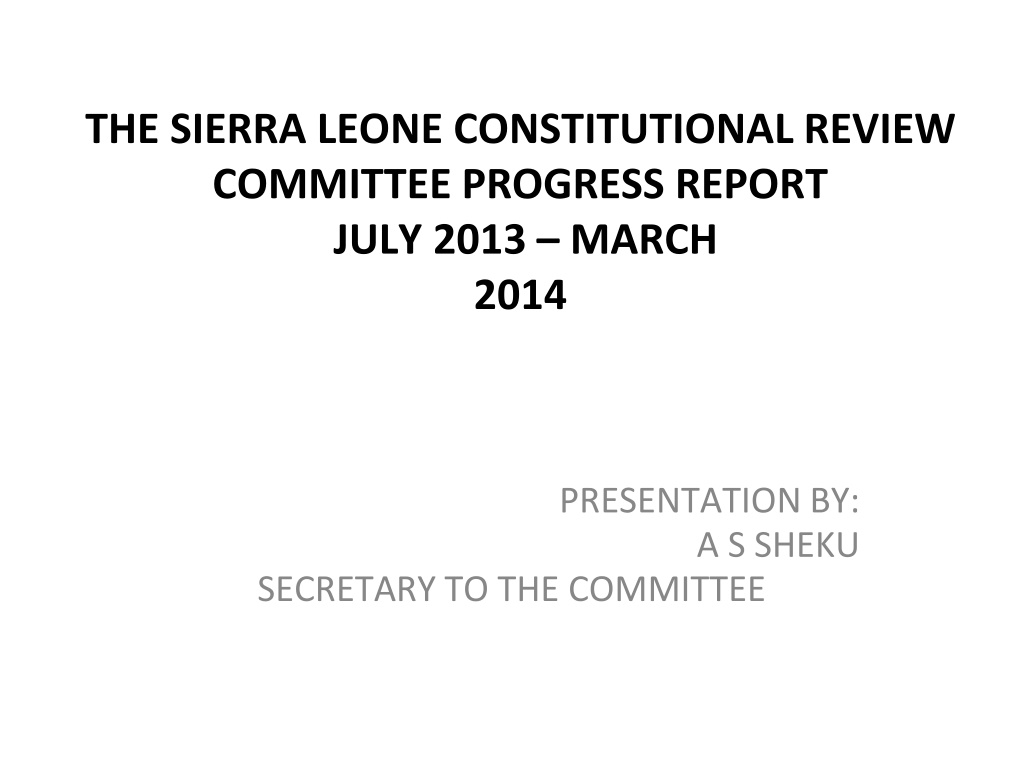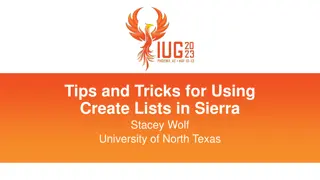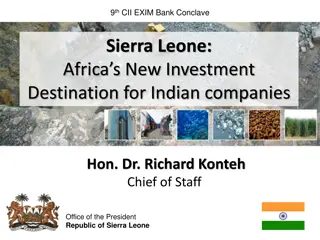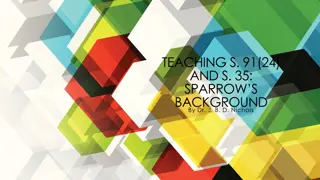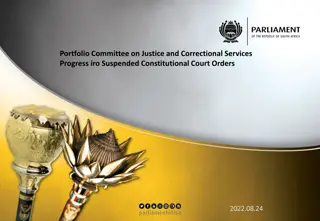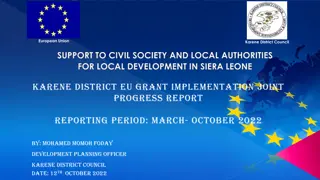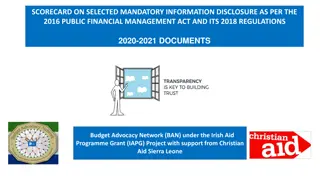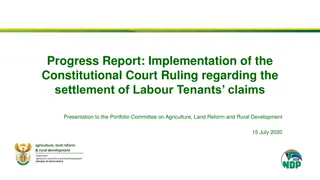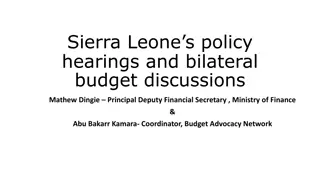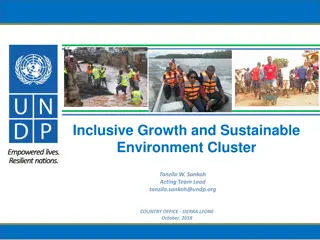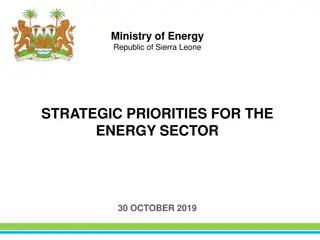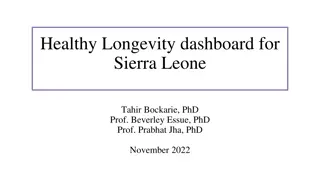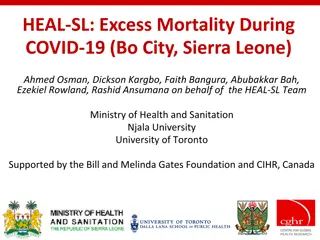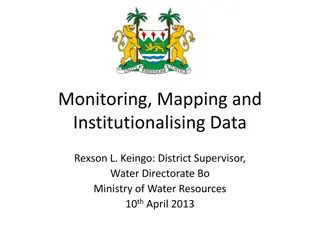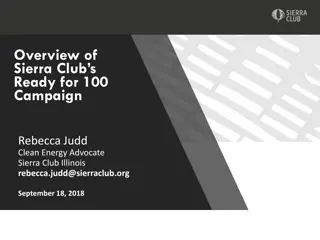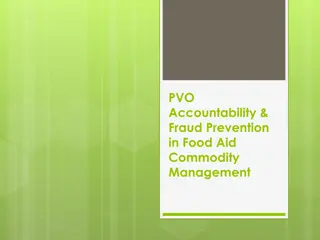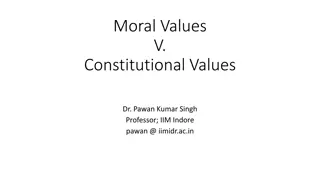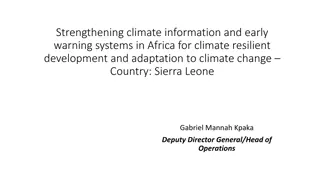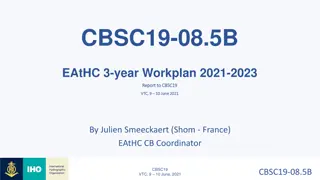Progress Report of Sierra Leone Constitutional Review Committee
The Sierra Leone Constitutional Review Committee was established in July 2013 to review the 1991 Constitution. The committee aims to develop a revised constitution for adoption by Parliament. The report outlines baseline indicators, targets, and achievements from July 2013 to March 2014, including capacity building, communication strategy, civic education, and public consultation activities.
Download Presentation

Please find below an Image/Link to download the presentation.
The content on the website is provided AS IS for your information and personal use only. It may not be sold, licensed, or shared on other websites without obtaining consent from the author. Download presentation by click this link. If you encounter any issues during the download, it is possible that the publisher has removed the file from their server.
E N D
Presentation Transcript
THE SIERRA LEONE CONSTITUTIONAL REVIEW COMMITTEE PROGRESS REPORT JULY 2013 MARCH 2014 PRESENTATION BY: A S SHEKU SECRETARY TO THE COMMITTEE
BACKGROUND The Eighty persons Constitutional Review Committee was constituted in July 2013 undertake an all inclusive and participatory process for the review of the 1991 Constitution of Sierra Leone in tandem with the Recommendations of the CRC submitted in 2008. The overarching deliverable of this task is to have a finalized constitutional review process with a revised constitution presented to parliament for adoption. To accomplish this object, the project Document jointly developed by GOSL and her development partners identified the following outputs: Capacity of CRC members developed to undertake effective constitutional review process Capacity of CRC secretariat to provide legal, research and administrative services to CRC developed CRC Communication and messaging strategy designed and implemented Civil Society led inclusive and informative civic education process completed CRC led inclusive and transparent civic education and public consultation process completed Enhance capacity of MPs, political parties and traditional leaders to effectively support and participate in the review process. I. II. III. IV. V. VI.
BASELINE, INDICATORS AND TARGETS 1. At the inception of the process the following baseline prevailed: CRC and CRC Secretariat were in there formative stages; Legal/ technical capacity of CRC members and secretariat staff was variable. No CRC communication strategy or activities underway. No CRC Civil Education and public consultation strategy was in place. Variable capacity of CSOs, media and MPs to engage with Constitutional review process By the end of the review process, it is envisaged that: CRC members are capable of producing technically proper amendments and recommendations. CRC Secretariat capable of providing high quality and timely services to CRC Effective civic education undertaken to build knowledge of constitutional issues Effective public consultation process undertaken to collect feed- back from across the Country. Media responsibly reporting on constitutional issues. MPs, women and youth specifically capacitated to engage constitutional process. CSOs network is established and effecting participating in the constitutional process
YEAR 1 TARGETS CRC agree on rules of procedure. CRC agree on work plan. CRC Secretariat set up and working to provide technical support to members. CRC website developed and sustained. CRC civil education and public consultation strategy developed. CSOs and trained to undertake civic education. Media trained on constitutional reporting.
WHAT HAS BEEN ACCOMPLISHED SO FAR Constitutional Review Committee Progress Report 2013/ 2014 Activities Description July August September October November December January February March 30th CRC Launched President Koroma launched the CRC at the Miatta Conference Centre in Freetown. 30th Members of the CRC announced 1991 Constitution and 2008 CRC Report distributed 2ndmeeting-CRC confirmed its Mandate and project document distributed to members CRC reviewed the draft rules of procedure for meetings, work methodology and work plan Rules of procedure and work plan approved 6th Inaugural Meeting 2ndmeeting 14th 3rdmeeting 29th 4thmeeting 12th
OTHER ACTIVITIES Secretariat has been set up. Equipment and furniture procured for the review process. Eleven vehicles have been procured by Government to provide mobility for CRC and they will be delivered today. Eleven Researchers have been assigned to provide technical support to CRC. Along the fringes of its work, CRC has supported CSOs and other governance institutions to host several activities to command attention to the review process and clarify issues in order to encourage citizen s partition.
Geographical Outreach Consultation Plan Information, Education and Communication Sub-Committee Code Target Group/Stakeholders Task/Consultation Theme Ministries of Education, Youth and Sports, Information and Communication Civic Education (includes sensitization on radio, television, drama, music) Consultation with different institutions on educational constraints (Students, Lecturers, Teachers), their contribution towards the constitutional review. Meeting various communities on the importance of education of the girl child. Consultation with traditional leaders, youth groups, women, children on their needs on the aspect of education. Debate on freedom of information with journalists, the print and electronic media in different communities Meeting stakeholders on their contribution towards the CRC A City Council schools, Missionary assisted schools and council schools in the provinces Institutions includes Universities and Tertiary Institutions B C The Council of Principals and Head Teachers, Professors D Sierra Leone Teachers Union, West African Examination Council, Student Unions, Sierra Leone Deaf and Dumb Association E Independent Media Commission, Sierra Leone Association of Journalist, Print and Electronic Media, National Telecommunication F Locals in different communities (including Youths, Children, Trade Union) G H Religious and Traditional
Geographical Outreach Consultation Plan Legislative Sub-Committee Code Target Group/Stakeholders Task/Consultation Theme Representation of the people section 31-39 of the 1991 constitution A Parliament Composition of parliament section 73-83 of the 1991 constitution B PPRC Bicameralism (a lower and upper chamber parliament) C NEC Non-appointment of parliamentarians as ministers D Local Councils E Ministry of Political Affairs F A.G s Office G Law Reform Commission H Inter Religious Council Gender and disability representation. I Traditional Leaders J Bar Association K Civil Society Groups L Educational Institutions M Political Parties
Geographical Outreach Consultation Plan Local Government and Other Ancillary Branches Sub- Committee Code Target Group/Stakeholders Task/Consultation Theme Active participation in discussions about the Constitution A Ministry of Local Government B Director of Rural Development C Inspector of Local Government D E Traditional Leaders Head of Civil Service F Director of Decentralization Service delivery No provision in the Constitution for decentralization Financial decentralization Council of Chiefs not effective G H Mayors of Councils Ward Committees I Court Staff of Local Councils J Core Staff of Local Councils K Provincial Secretaries & Officers L Local Councilors District Officers M N Director Rural Development O P Q R S T U V Councilors Chiefs Chief Administrator District Youths Advisory Committees Treasury Clerks Women s Group Director General HRMO Devolving Ministries, Departments & Agencies Direct participation of PC or Traditional Leaders in Legislative Process W
Geographical Outreach Consultation Plan Research Sub-Committee Code Target Group/Stakeholders Task/Consultation Theme A Cabinet/Presidency B Political Parties Executive Government C Civil Society Groups Natural Resources D Traditional Leaders Legislative E Tertiary Institutions Judiciary F Independent Experts Local Government Human Rights G Trade Unions Information H Diaspora Education I Media Communication J Legislature K Local Councilors L Judges M Students N Land Owners O Mining Companies P Local Youth Groups Q Human Rights Commission R NGOs S Justice Sector Institutions T Community
Geographical Outreach Consultation Plan State Policy and Human Rights Sub-Committee Educational Institutions/ Students/ Academic staff, Associations/ Experts A Bail, Undue delay, Death Penalty, Legal Aid, Justiciability, Minority Rights, Discrimination, Unlawful Detention, Freedom of Speech and Freedom of the Media, Freedom of Movement and Assembly, Harmful Cultural Practices, Prison conditions, Police powers, Abortion, Torture, Sexual and Gender-Based Violence, Teenage Pregnancy. Freedom of Speech and Freedom of the Media Bail, Undue delay, Paucity of benchers, Legal Aid, Death Penalty, Prison Conditions, Discrimination, Sexual and Gender-Based Violence, Minority Rights B C Political Parties Human Rights Commission Independent Media Commission, Sierra Leone Association of Journalists and Society for Democratic Initiatives D Judiciary, Ministry of Justice, Justice Sector Coordination Office, Law Reform Commission E F Legislators and Local Councilors G Network of Human Rights Defenders H Prisons Department Unlawful arrest and detention, CID Treatment, Right to Assembly/Procession, Right to life, Crowd Control I Sierra Leone Police Harmful cultural practices, Gender-Based Violence, Discrimination, Land rights, Chieftaincy Rights, Marriage, Succession and Minority Rights J Traditional and Religious Leaders Discrimination, Sexual and Gender-Based Violence, Property Rights, Harmful Cultural practices, Land rights, Marriage, Succession, Teenage pregnancy K Women s Groups Discrimination, Land Rights, Employment, Police Powers (Arrest and Detention), Minority Rights L Youth Groups
CHALLENGES Funding remains CRC s greatest challenge. Inadequate technical and managerial capacity at CRC Secretariat. Serious space capacity constraint Limited equipment Unmotivated staff
THE END THANKS FOR YOUR ATTENTION
